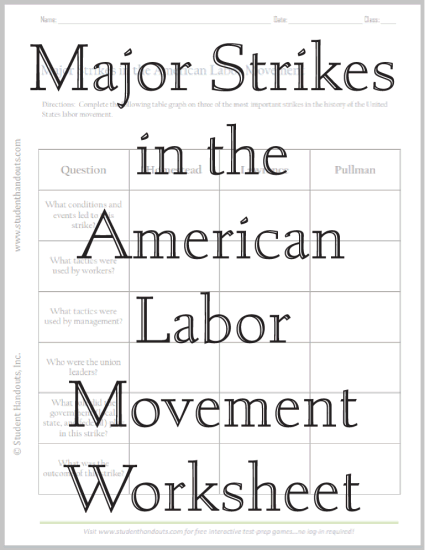| Major Strikes in the American Labor Movement |
| www.studenthandouts.com > U.S. History > Discontent and Reform > Worksheets |
|
With this worksheet, students are asked to answer questions on three of the most important labor strikes in United States history--the Homestead, Lawrence, and Pullman strikes. Questions include: What conditions and events led to this strike? What tactics were used by workers? What tactics were used by management? Who were the union leaders? What role did the government (local, state, and federal) play in this strike? What was the outcome of this strike? |
 |  |
|---|
| Click here to print this worksheet (.pdf file). Answers will vary.
The Homestead Strike of 1892 was a significant labor dispute that took place in Homestead, Pennsylvania, at the Homestead Steel Works, which was owned by the Carnegie Steel Company, a subsidiary of U.S. Steel. The strike was a pivotal moment in the history of labor relations and workers' rights in the United States. Background: The Carnegie Steel Company, under the leadership of industrialist Andrew Carnegie, had been engaged in a series of wage cuts and labor disputes, which created tensions between the company and its workers. Causes: In 1892, the company's management, led by Henry Clay Frick, sought to break the Amalgamated Association of Iron and Steel Workers (AAISW), a labor union that represented many of the skilled workers at the Homestead mill. Frick's strategy included cutting wages, locking out union members, and attempting to operate the mill with non-union workers and strikebreakers (often referred to as scabs). The Strike: On June 30, 1892, the workers at the Homestead Steel Works, mainly members of the AAISW, went on strike in response to the wage cuts and the presence of strikebreakers. The workers took control of the plant and barricaded themselves in, effectively shutting down production. Violence Erupts: In response to the strike, Frick, who had taken a hardline approach, hired a private security force known as the Pinkerton detectives to break the strike and regain control of the mill. A violent confrontation occurred on July 6, 1892, when Pinkerton agents attempted to land at the Homestead plant from barges on the Monongahela River. Striking workers and townspeople confronted the Pinkertons, leading to a bloody battle in which several people were killed and many were injured. (The Pinkertons were known for their violence toward labor.) Resolution: State militia was eventually called in to restore order, and the strike was broken. The plant was reopened with non-union labor, and many striking workers lost their jobs. Legacy: The Homestead Strike became a symbol of labor resistance and the struggle for workers' rights. It highlighted the often violent and confrontational nature of labor disputes during the late 19th century. While the strike itself was not successful in achieving its immediate goals, it contributed to the broader labor movement in the United States and led to increased awareness of workers' rights and the need for labor reforms. The Homestead Strike remains a pivotal event in American labor history, illustrating the challenges and conflicts that arose as workers sought to improve their working conditions and protect their livelihoods during a period of industrialization and labor unrest. |
| www.studenthandouts.com > U.S. History > Discontent and Reform > Worksheets |









